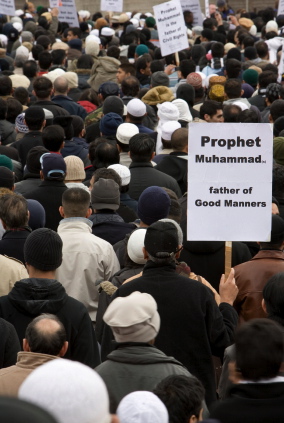
London, Nov 29 (IANS) — The guidelines drafted by the Mosques and Imams National Advisory Board (Minab) – an independent umbrella group of four major Muslim organisations set up last year – urge the leaders of British mosques to reform and modernise in order to prevent extremism.
The Minab’s government-backed 10-point draft code of practice is particularly aimed at encouraging young people and women to help in Britain’s war against terrorism.
It wants women to become more involved in mosques in order to stop young people from being recruited by extremist groups.
There are said to be anywhere between 1,350 and 1,600-plus mosques in Britain, serving a Muslim population of 1.6 million – around 2.8 percent of the total population – and they will need to sign up to the code if it is to succeed.
“It’s going to be quite a challenging task that we are embarking upon because this is something that has not been done before,” said Yousif Al-Khoei, one of the plan’s joint architects.
Al-Khoei, a leading Shia Muslim in Britain, said there was unprecedented determination to make the body work.
“We are four different groups from different backgrounds and we believe we have managed over two years of hard negotiation to come up with something that will work,” he told British Broadcasting Corporation (BBC) news.
The proposals are part of the government’s serious efforts to build a more inclusive Britain and encourage greater Muslim participation in mainstream life in a social response to the July 7, 2005 suicide-bombings in London, in which 52 people were killed.
The proposal for self-regulation came from within the Muslim community after the government warned that some mosques were being used by radical groups to recruit marginalised, frustrated and impressionable young men.
In proposals that are expected to be met with resistance among some mosques, the code urges Imams across Britain to condemn forced marriages and domestic violence as “un-Islamic” and allow women to have greater access to religious training in mosques.
The involvement of British Muslim women, who have long complained of being excluded from mosques, is thought to be key to the success of the programme.
The proposals also try to encourage greater transparency in how funds are raised and increase the skills and competence of the country’s 2,000-plus Imams, many of whom were born abroad in South Asia and North Africa.
Also controversial is the Minab’s recommendation to set up a community watchdog with powers to make unannounced visits for spot-checks on mosques.
Communities Minister Hazel Blears said strong mosques will be better able to withstand attempts to hijack them.
The new code of practice “shows that Muslim communities want to make the changes that will build community cohesion and ensure that mosques are playing a role at the heart of communities,” she said Thursday.
“Strong mosques positioned at the centre of community, and effectively governed, will be better able to withstand attempts to hijack them by certain groups supporting violent extremist interpretations of Islam,” Blears added.
© 2007 IANS India Private Limited, New Delhi. Posted on Religioscope with permission. — Indo-Asian News Service (IANS) is India’s first multinational and multilingual wire service. Website: www.ians.in. Subscription enquiries: contact IANS (mention Religioscope).